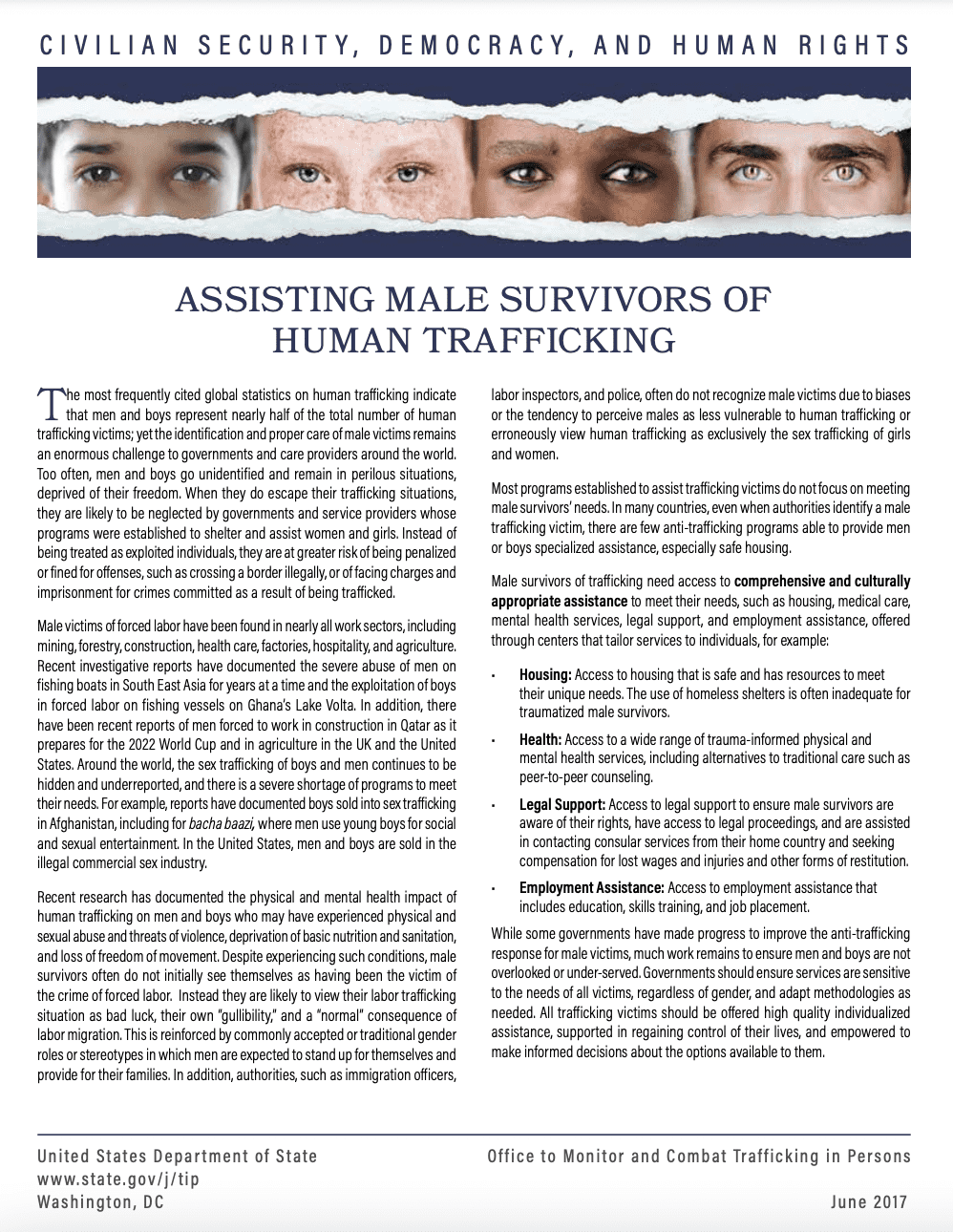
Assisting Male Survivors of Human Trafficking
ASSISTING MALE SURVIVORS OF HUMAN TRAFFICKING CIVILIAN SECURITY, DEMOCRACY, AND HUMAN RIGHTS
The most frequently cited global statistics on human trafficking indicate that men and boys represent nearly half of the total number of human trafficking victims; yet the identification and proper care of male victims remains an enormous challenge to governments and care providers around the world. Too often, men and boys go unidentified and remain in perilous situations, deprived of their freedom. When they do escape their trafficking situations, they are likely to be neglected by governments and service providers whose programs were established to shelter and assist women and girls. Instead of being treated as exploited individuals, they are at greater risk of being penalized or fined for offenses, such as crossing a border illegally, or of facing charges and imprisonment for crimes committed as a result of being trafficked.
Male victims of forced labor have been found in nearly all work sectors, including mining, forestry, construction, health care, factories, hospitality, and agriculture. Recent investigative reports have documented the severe abuse of men on fishing boats in South East Asia for years at a time and the exploitation of boys in forced labor on fishing vessels on Ghana’s Lake Volta. In addition, there have been recent reports of men forced to work in construction in Qatar as it prepares for the 2022 World Cup and in agriculture in the UK and the United States. Around the world, the sex trafficking of boys and men continues to be hidden and underreported, and there is a severe shortage of programs to meet their needs. For example, reports have documented boys sold into sex trafficking in Afghanistan, including for bacha baazi, where men use young boys for social and sexual entertainment. In the United States, men and boys are sold in the illegal commercial sex industry.
Recent research has documented the physical and mental health impact of human trafficking on men and boys who may have experienced physical and sexual abuse and threats of violence, deprivation of basic nutrition and sanitation, and loss of freedom of movement. Despite experiencing such conditions, male survivors often do not initially see themselves as having been the victim of the crime of forced labor. Instead they are likely to view their labor trafficking situation as bad luck, their own “gullibility,” and a “normal” consequence of labor migration. This is reinforced by commonly accepted or traditional gender roles or stereotypes in which men are expected to stand up for themselves and provide for their families. In addition, authorities, such as immigration officers, labor inspectors, and police, often do not recognize male victims due to biases or the tendency to perceive males as less vulnerable to human trafficking or erroneously view human trafficking as exclusively the sex trafficking of girls and women.
Most programs established to assist trafficking victims do not focus on meeting male survivors’ needs. In many countries, even when authorities identify a male trafficking victim, there are few anti-trafficking programs able to provide men or boys specialized assistance, especially safe housing. Male survivors of trafficking need access to comprehensive and culturally appropriate assistance to meet their needs, such as housing, medical care, mental health services, legal support, and employment assistance, offered through centers that tailor services to individuals, for example:
• Housing: Access to housing that is safe and has resources to meet their unique needs. The use of homeless shelters is often inadequate for traumatized male survivors.
• Health: Access to a wide range of trauma-informed physical and mental health services, including alternatives to traditional care such as peer-to-peer counseling.
• Legal Support: Access to legal support to ensure male survivors are aware of their rights, have access to legal proceedings, and are assisted in contacting consular services from their home country and seeking compensation for lost wages and injuries and other forms of restitution.
• Employment Assistance: Access to employment assistance that includes education, skills training, and job placement.
While some governments have made progress to improve the anti-trafficking response for male victims, much work remains to ensure men and boys are not overlooked or under-served. Governments should ensure services are sensitive to the needs of all victims, regardless of gender, and adapt methodologies as needed. All trafficking victims should be offered high quality individualized assistance, supported in regaining control of their lives, and empowered to make informed decisions about the options available to them.
Read more here.
